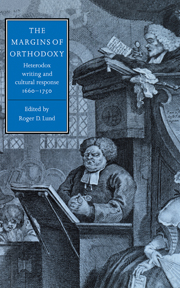Book contents
- Frontmatter
- Contents
- List of contributors
- Acknowledgments
- Introduction
- PART I THE IDEOLOGY AND ORIGINS OF HETERODOXY
- PART II LOCKE AND HETERODOX OPINION
- 3 Anticlericalism and authority in Lockean political thought
- 4 John Locke: conservative radical
- PART III POLICING THE MARGINS
- PART IV ORTHODOX DEFENSES, HETERODOX RESULTS
- Select bibliography
- Index
4 - John Locke: conservative radical
Published online by Cambridge University Press: 09 October 2009
- Frontmatter
- Contents
- List of contributors
- Acknowledgments
- Introduction
- PART I THE IDEOLOGY AND ORIGINS OF HETERODOXY
- PART II LOCKE AND HETERODOX OPINION
- 3 Anticlericalism and authority in Lockean political thought
- 4 John Locke: conservative radical
- PART III POLICING THE MARGINS
- PART IV ORTHODOX DEFENSES, HETERODOX RESULTS
- Select bibliography
- Index
Summary
INTRODUCTION
There are many reasons why the interpretation of Locke remains a live issue. One is the wide range of his writings, another is the way in which he often so carefully covered his tracks in areas which he knew to be controversial. A third is a growing realization of the importance of reading his texts from within the context in which they were written and the increasing recognition, extending over at least some twenty years, of the central importance of Locke's religious commitments to a proper understanding of his thought. This chapter is concerned with some aspects of that relationship.
The relationship between Locke's religion and his philosophical thought obviously works two ways. Locke's theological beliefs are likely to impinge on his philosophy, indeed much more than some modern commentators, who have a tendency to read him as if he were some secular representative of twentieth-century philosophy, would allow. But here I also wish to lay stress on the converse relationship, on the way in which Locke's theological convictions are monitored by his philosophical principles, more specifically by his epistemology. Part of my objective is to show how this is true and to suggest that it was because of this rigorous discipline that Locke was sometimes taken to be either more of a skeptic in matters of religion than in truth he was, or that he was taken as more radical in his theology than was the case. None of this, however, will detract from the conclusion that Locke's intellectual position should, with some justice, be regarded as radical in its theological implications.
- Type
- Chapter
- Information
- The Margins of OrthodoxyHeterodox Writing and Cultural Response, 1660–1750, pp. 97 - 116Publisher: Cambridge University PressPrint publication year: 1995
- 2
- Cited by



